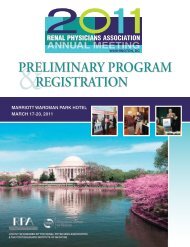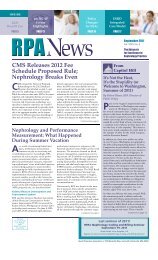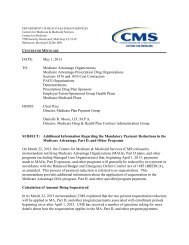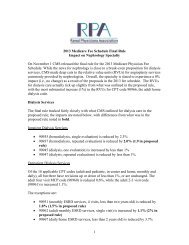The RPA Health Policy Handbook - Renal Physicians Association
The RPA Health Policy Handbook - Renal Physicians Association
The RPA Health Policy Handbook - Renal Physicians Association
You also want an ePaper? Increase the reach of your titles
YUMPU automatically turns print PDFs into web optimized ePapers that Google loves.
grassroots Advocacy and Congress<br />
CHaPTeR 2<br />
Building<br />
Structures<br />
UnDeRsTanDInG THe TaRGeTs To<br />
MaXIMIZe effeCTIVeness<br />
Congress is the legislative branch of the federal government. It creates the laws needed to<br />
govern, determines which government agencies and programs will be created, and approves<br />
all funds spent by the government. Congress has specific powers: to collect taxes, raise<br />
armies, declare war, regulate commerce, and provide for the general welfare. Congress can<br />
also act more generally by passing any law necessary to execute the powers granted to it by<br />
the Constitution.<br />
Congress enacts legislation but cannot implement it. <strong>The</strong> executive branch (the<br />
Administration) is charged with implementation (see below), but Congress does retain<br />
oversight power and may investigate how the executive branch has administered the<br />
programs or laws Congress has approved.<br />
Congress is divided into two parts, the Senate and the House of Representatives. <strong>The</strong>re are<br />
100 Senators, two from each state. <strong>The</strong> House of Representatives has 435 members. <strong>The</strong><br />
number of Representatives allotted to each state is based on the state’s population. States with<br />
large populations have more representatives. For example, California has 52 Representatives,<br />
while North Dakota has just one.<br />
grassroots Advocacy and the Administration<br />
<strong>The</strong> Administration is the executive branch of the federal government and is responsible for<br />
enforcing the laws that Congress passes. <strong>The</strong> president, vice president, department heads<br />
(cabinet members), and heads of independent agencies carry out this mission.<br />
<strong>The</strong> Department of <strong>Health</strong> and Human Services (HHS) is the federal government’s<br />
principal agency with which <strong>RPA</strong> works. HHS includes more than 300 programs, covering a<br />
wide spectrum of activities including:<br />
■■ <strong>Health</strong> and social science research<br />
■■ Preventing disease, including immunization services<br />
health policy handbook for nephrology practitioners<br />
CHaPTeR 2<br />
3












